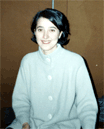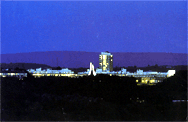Lucky Me
Nino Nijaradze
 “Lucky
her”-that’s what I would have said hearing about someone doing a Master’s
degree course in Great Britain, especially if this someone had spent almost
all her life studying and teaching English. A course at Lancaster University
with the department of linguistics that has been among the top three
departments in Britain for years, a British Council scholar, the course
funded by Hornby scholarship. Lucky indeed. But surprising as it may sound,
I did not feel very happy when all this was offered to me. When planning
this year and on my way here all I could think of, was what I was leaving
behind, my friends, my colleagues, the work that I love, the department that
has become my second home and most importantly my family.
“Lucky
her”-that’s what I would have said hearing about someone doing a Master’s
degree course in Great Britain, especially if this someone had spent almost
all her life studying and teaching English. A course at Lancaster University
with the department of linguistics that has been among the top three
departments in Britain for years, a British Council scholar, the course
funded by Hornby scholarship. Lucky indeed. But surprising as it may sound,
I did not feel very happy when all this was offered to me. When planning
this year and on my way here all I could think of, was what I was leaving
behind, my friends, my colleagues, the work that I love, the department that
has become my second home and most importantly my family.
And then I was in Lancaster and the academic year had started. At first I got lost every time I left my flat; I met amazing numbers of people every day and had a hard time remembering what countries they came from (to say nothing of their names); I had to draw a map in the air with my finger explaining where Georgia was every time I met a new person. Then I suddenly discovered that the campus was so small, it was impossible to get lost; that I knew many people and had quite a few new friends. It is all so vivid in my memory that I cannot believe it was three months ago.
On the other hand it seems unbelievable that I have only spent three months here because these were very, very busy months packed with classes, reading, library visits, more reading and finally, assignments.
Master’s degree course here involves taking six courses for credit and two support courses during the year, writing six essays and a final dissertation. The courses are very intense covering broad areas of research and the students are expected to use the lectures as a mere starting point for independent in-depth study and their own research. This means a lot of reading and more importantly critical thinking, the skill that we are encouraged to show in all our work.

Believe me, doing a course in Lancaster is very demanding and it is not made any easier by the fact, that all our professors are recognized authorities in their fields. Keith Johnson, whose research has influenced many areas in applied linguistics, is my course tutor. The idea of language testing has become inseparable with the name of Charles Alderson all around world, but we dare even argue with him in our testing class. Norman Fairclough, “founding father” of critical discourse analysis, leads one of the courses I take. I will not mention all the other names that make me very proud of being a student here. On the other hand the thought, that they are the ones who will be reading and assessing my assignments in a few weeks time, is not very comforting.
Will I manage to show how interesting and rewarding their classes have been, prove that I have learnt a lot, that I can think independently? It is not going to be easy.
So here I am, on Christmas Eve, away from home, sitting in a tiny quiet room with my head buried in books. And believe it or not I do feel lucky.
After a year ...
The Year that Gave Me Wealth of Experience
In August I came back from Great Britain having completed a Masters’ degree course in language teaching at Lancaster university. This whole year gave me such wealth of experience and awakened so many new thoughts in my mind that all of it could not possibly be shared in one short article. However, I think it could be interesting for a Georgian reader to learn what doing such a course generally implies.
It was a very intensive course in which during one academic year students have to take six core modules and can volunteer to take four more. The assessment is based on the results of written assignments in all six core modules and a final dissertation. Maximum effort is made to allow for some flexibility and adapt the course to the students’ individual needs. Only two of the modules are compulsory depending on the strand or particular requirements of the course. The student has a free choice of the other four core modules. In my case, for example, my desire to tailor the course to my needs as a practicing teacher determined this choice. So I decided on the modules which focused on the modern developments in English Language Teaching methodology. In fact, the department offers quite a number of modules and no student can possibly do them all. So you have to choose the most necessary ones for you but they are all so interesting and relevant it can be a difficult decision. The fact that many of these courses are taught by professors who are world class experts in their fields further complicates making this choice.
I cannot avoid mentioning the effort the university administration puts into creating the environment conducive to academic work. Facilities that Georgian students can only dream of are made available to the students, especially those doing a post-graduate course. They have 24-hour access to computer labs, photocopying facilities. Internal computer network makes the communication between the departments and students easier. I was particularly impressed with the university library. Only rarely does it happen that a required book or a journal cannot be found there and even then the library takes the responsibility for obtaining the needed item.
Even this very brief overview is enough I think to give the reader some flavour of what the academic process is like at Lancaster university. I feel very lucky that I was given a chance to part of this process for a whole year and deeply grateful to the British Council and Hornby foundation who made it possible. I also fully realize that this wonderful opportunity was provided not only for my personal benefit. Thus I am happy to see that the experience of Lancaster University linguistics department is being implemented at Kutaisi State university English Studies Department. We are already working on a new curriculum in ELT methodology that envisages considerable quantitative and qualitative changes in the existing program. Also a new module “Managing Innovation in ELT” has been added to the syllabus of the post-graduate course. It is hoped that this module will contribute to preparing the teachers better for work in the constantly and rapidly changing world of ELT.